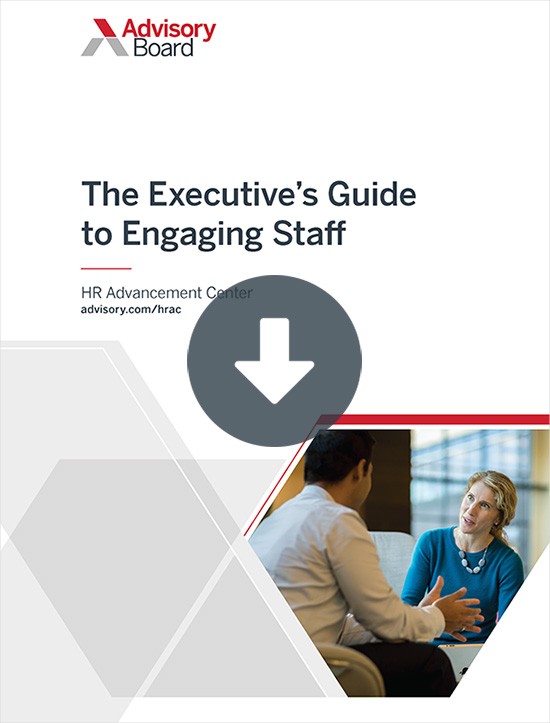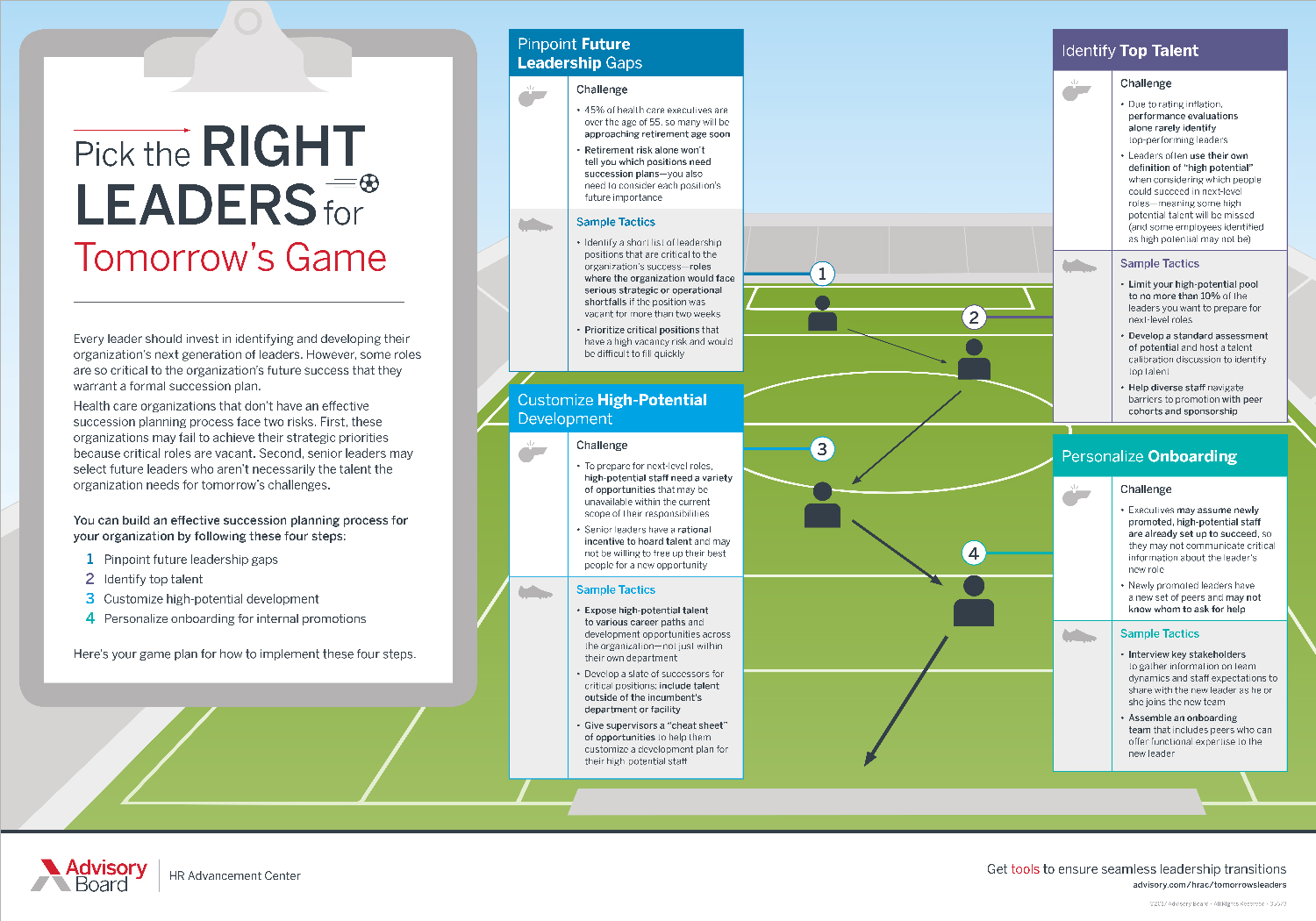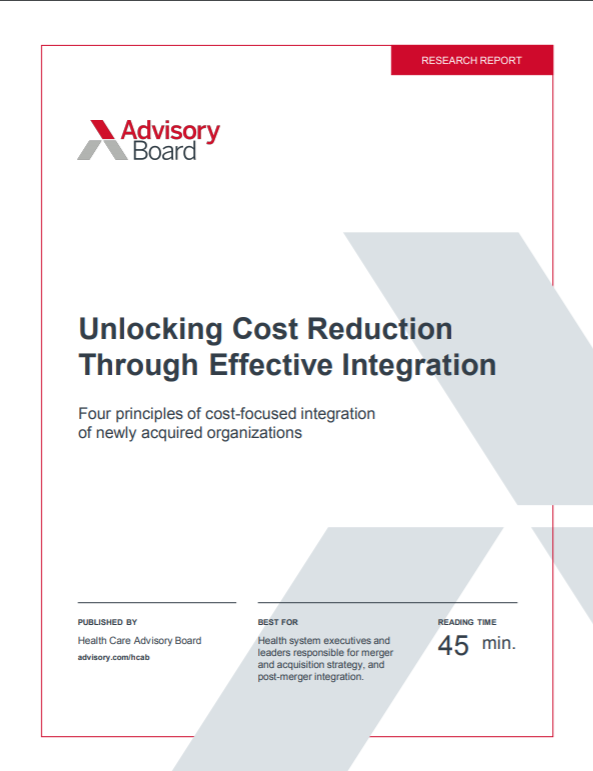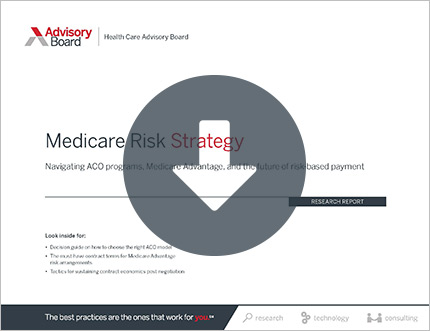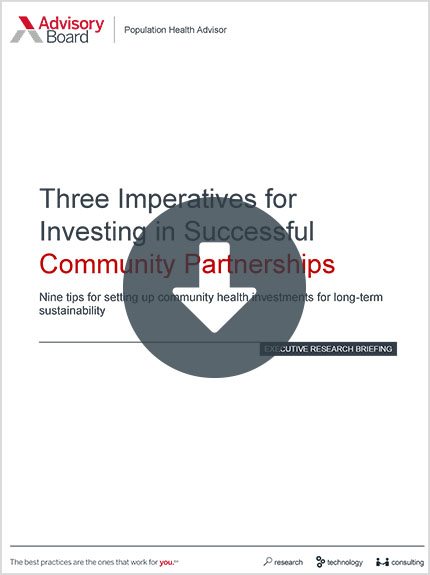Auto logout in seconds.
Continue LogoutWelcome to the "Lessons from the C-suite" series, featuring Advisory Board President Eric Larsen's conversations with the most influential leaders in health care.
In this edition, Laura Kaiser, president and CEO of SSM Health, talks about the call to nonprofit health care, SSM Health's legacy of caring for "Our Dear Lords," and why she's completed at least one triathlon almost every year—for the last 36 years.
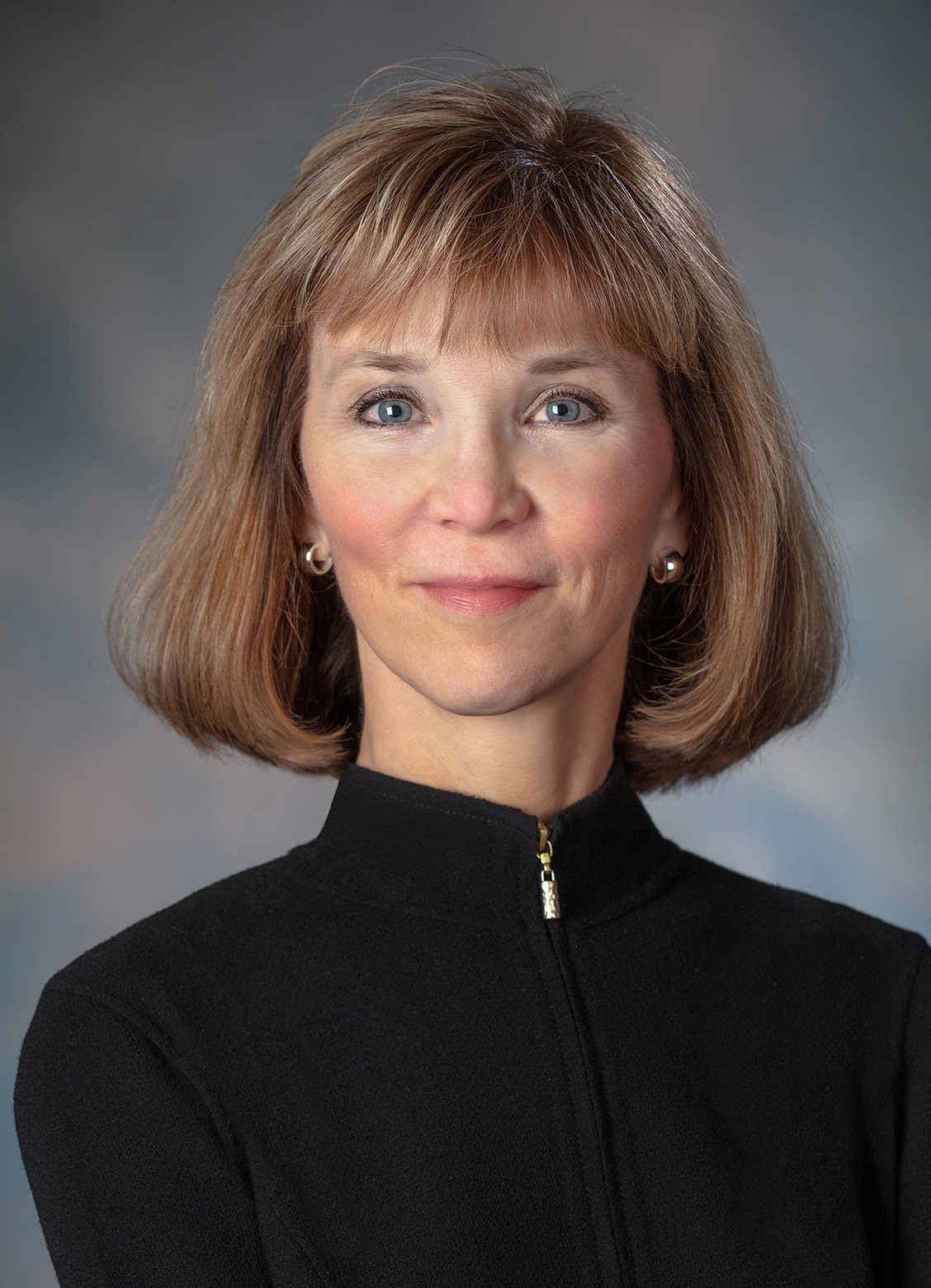
Laura Kaiser, president and CEO of SSM Health
Question: Laura, you've been at the helm of SSM Health—a $7.5 billion health care system with 23 hospitals, 41 affiliates, and nearly 40,000 employees—not to mention the Dean Health Plan, Navitus Health Solutions (PBM), and a leading role in national collaboratives like CivicaRx, for more than two years. But you've been a leader in the health care industry, especially Catholic health care, for much longer than that. Is there a particular moment that inspired your interest in not just health care, but nonprofit, faith-based service?
Laura Kaiser: You know, Eric, when I was a young health care leader, I took a job as COO for a physician-owned company in Kansas City. At the start of that job, I had a welcome lunch with my then-boss, and about a half-hour in, he said, "You know, payroll's a week from Thursday. How are we going to meet that?"
That was a shocking, defining moment for me. I've always thought about leadership differently since that day and I'm grateful for that experience. It taught me that whether you're a nonprofit or for-profit organization, you must have a culture of accountability to ensure everyone in your organization can rely on and trust your leadership. I worked there a year before I went to Daughters of Charity National Health System, which then became Ascension Health.
Early on, my parents instilled in me the importance of service to those in need and the belief that I should leave the world better than I found it. Health care has been the place to use my talents to make a positive impact—or to "Be the change you wish to see in the world," as Gandhi said.
The great thing about working in a faith-based ministry is that you get to bring your whole self to work. You don't have to leave your personal values and convictions at the door. When there is alignment between one's value set and career, it is much more satisfying, and you can be more effective.
Q: You spent 15 years with Ascension, culminating in your role as CEO of Sacred Heart in Florida, before heading cross-country for a new role as COO at Intermountain. What precipitated the move to Intermountain—after such a long, and by all accounts successful and gratifying—tenure at Ascension?
Kaiser: I hadn't been looking to make a change. With 11 different roles in my 15 years at Ascension, I had the opportunity to grow and contribute. When Intermountain's recruiters reached out, it felt like the time was ripe for a different growth opportunity. I went to Salt Lake City and found that what I had seen from afar was real: The organization endeavors to be a model health care system. It is clinically driven and full of motivated people trying to do the right thing.
So, I decided to take the job. It was a big risk to move my family across the country in terms of, "What if it's not what you think?" And I had heard from a number of people, "First of all, you're not internal, you're not Mormon, you're not male, so we're not sure how that's going to go for you." Fortunately, it was an extraordinary experience and I felt very welcomed. In fact, we liked it so much that my husband and I have talked about retiring back in Utah when that time comes.
Q: And from Intermountain you returned full-circle to Catholic health care, and to your hometown of St. Louis, joining SSM Health.
Kaiser: Yes, a homecoming. It seemed like a momentous time at SSM Health in terms of the transformational possibilities. The board and leadership were poised for significant change, and I, as a change agent, found that really appealing. It is also a strong Catholic organization, so as a mission- and values-based person, it was a great fit for me personally and professionally.
But the move itself was a strange experience. I've cycled in and out of St. Louis over the years, growing up here, going to undergrad and later graduate school here, and then eventually returning for SSM. But my parents had passed away, and for the first time, I didn't have family in the area. For the first few weeks, I felt out of sorts, which is uncharacteristic because I’m generally an optimistic and upbeat person. I realized my sadness was due to being flooded with missing my parents—their gravesites are within a mile of my office and the headquarters for Monsanto, where my father worked, are in the same place as my corporate office. When I had that in context, I recalibrated and it's all good again.
'Righting the ship'
Q: Let's talk about your first two plus years here at SSM Health. You've recruited and established a largely new leadership team and launched some bold-stroke strategic moves. I'd love to hear some of your first impressions on arrival, and some of the key strategic "repositioning" underway.
Kaiser: SSM Health was founded in 1872 and has an extraordinary legacy of high-quality, faith-based care. I joined a remarkable group of people with a strong work ethic, along with a very rich mission-based culture.
However, like most U.S. health systems, our ministry needed to be repositioned. Health care as a whole has not done a very good job of evolving to meet the changing needs of our communities. I saw—and continue to see—this as an opportunity to re-invent ourselves. We must disrupt ourselves or risk disruption from outside forces. I believe the next 10 years will be a defining period for the American health care system, and SSM Health can help lead that change. Thankfully, the incredible caregivers and team members at SSM Health have a real willingness for change, even when the path ahead is somewhat murky. That's the work that's been underway for the past couple of years.
The biggest thing initially, I think, was that we were operating as a federation of places and not as a fully integrated system. That's partly because we’ve more than doubled in size over the past decade, which introduced a lot of variation in systems, processes and even culture. Plus, we operate in four varied markets—Illinois, Missouri, Oklahoma, and Wisconsin. On top of that, we faced the same challenges as many others in our industry including decreasing payment, competition for talent at all levels, and physician alignment.
We are now working more intentionally as a system to better address the challenges and opportunities ahead that we are all facing across the country.
Q: So, you joined SSM Health in May 2017, and immediately discerned what sounds like some urgent changes that needed to be made. I also remember the finances at that time were a bit precarious.
Kaiser: Yes, exactly. When I arrived, initial projections were for us to end the year in the red. This was unacceptable, so I rallied the team to begin the work of improving our performance. At the end of that fiscal year, we netted just $6 million on $7 billion in total revenue. At the end of last year, we recorded $124 million in operating income.
It's not enough, of course, but it's a great turn. Through the hard work of our thousands of team members, we're heading in the right direction.
Q: What were some of the main changes you implemented to right the ship?
Kaiser: Well, I told the team that I was going to be heavily involved in operations for the first six or seven months because of the negative financial trajectory, due in part to our risk pools in Wisconsin, changes in Medicaid payment levels, and because we weren't yet hardwired to act as a system. That's not what your CEO should do in the long run, but it's what was needed at the time.
I also assessed leadership in terms of what I felt would be needed to transform the organization to meet the changing landscape. This meant we needed to bring in talent that could help us move in new directions. In addition, the board was already in the midst of some pretty significant changes when I arrived. They were shifting away from the Carver model, where the CEO is the board's only point of interaction with the leadership team. Also, the board had no committees: no quality, finance, governance, or other committees you would expect.
Re-ignite the growth engine: 3-part report series
Fast-forward to today, 10 of the 12 leaders in our senior team are new to the organization or in new roles, and the board has grown from seven to 17 members. We've also instituted fully functioning board committees as well.
Of course, there's always more to do, but it came down to putting systems in place to operate more effectively and efficiently, aligning with our growing board, establishing our senior leadership team, and renegotiating some key physician, supplier, and payer contracts.
Q: You're talking, Laura, about this all-important work of "systemness" at SSM Health. I'm interested in juxtaposing where SSM Health is on this systemness journey with your experience as COO at Intermountain. Intermountain, of course, is one of the vanguard systems out there in terms of a standard operating model, and more advanced system initiatives around clinical variation reduction. All that is to say, you're in a unique position to answer the key strategic question: What does it mean to be a system?
Kaiser: I agree this is a key question. I've been at both the system and local level over the course of my career. When in a system role, I thought we were always being helpful to our team members at the ministry sites. I didn't fully understand the underlying tension until serving in a local role at Ascension and attended a regional meeting. After the meeting, I turned to another attendee and said, "Everybody in the corporate office should serve in the field, and local leaders should experience a system-level role." I realized how easily well-intentioned plans can become overly systematized and heavy-handed. You have to find the right balance.
I want to standardize only where it makes sense. For instance, it makes perfect sense that we standardize biomedical engineering across the system—that's helpful; we'll realize substantive savings annually with no impact to quality of service. It's different for clinical standardization. That should be more like what Dr. Brent James, Intermountain's former chief quality officer, often said about "cookbook medicine": Doctors have a recipe available to them, but they should use their clinical judgment to deviate from that as appropriate.
Q: Where does SSM Health stand on the spectrum of systemization?
Kaiser: If we had a scale where 0 is wholly siloed and 100 is completely systematized, we were at about a 15 or 20 when I arrived, and we're probably at 50 now with more to follow.
Dean Health as an 'incubator' for change
Q: I think our readership would be curious to know more about your experience with Dean Health Plan. Obviously, there are a lot of well-documented struggles with provider-sponsored health plans, and it seems Dean is on the path to prosperity. Let's start with the basics: What's the breakdown of your 405,000 covered lives among commercial, Medicare, and Medicaid?
Kaiser: There are about 3,000 lives in Medicare Advantage, so it's still growing and currently only offered in Wisconsin. A majority—roughly 270,000—is commercial. The rest are Medicaid and through the exchange.
Q: And I'm inferring from your comments that Dean has stabilized as an organization. Going forward, is one of the aspirations to take Dean and apply it to the other states?
Kaiser: Absolutely, that's one of our aspirations. In my experience, everyone benefits when payers and providers are aligned, especially our patients. In fact, we'll be offering a new individual exchange product in St. Louis for open enrollment this fall. It will be operated by Dean Health Plan, under the name Wellfirst Health.
However, we will not be able to solve health care for our patients and communities by simply introducing our own provider-sponsored plan to all of our markets. SSM Health needs to be an attractive partner who brings payers and providers together to move incentives to the right place: prevention and overall health.
Q: This brings to mind two Harvard Business Review articles from Intermountain a few years back. One is an article you co-authored that posits the strategic advantage of value-based care, regardless of market conditions, while the other focuses on the volume-to-value transition, theorizing that once you hit 23% to 29% capitation, you can afford to practice fully value-based medicine, and the economics go around the block. What do you think about this construct, given your experience at Intermountain and now at SSM Health?
Kaiser: There is a lot of debate about what the "magic number" is for the transition to a value-based model, but I think it's less about the percentage and more about the overall need to shift incentives and alignment. At Intermountain, for instance, we were payer agnostic, meaning that employed physicians didn't have to worry about their payer mix—they were paid on a mix of production, quality and service standards, without needing to know whether a patient was or wasn't at risk.
Whether it's Intermountain or SSM Health, our job is to make sure payment systems are set up to allow our providers to practice at the top of their license and do what is best for patients, no matter the type of coverage. The goal must be to work with clinicians to limit unnecessary utilization, better manage chronic disease and focus on preventive medicine because it is what our patients and our nation deserves. Given the fact that health care has been slow to adopt this transformation, I continue to believe that a shift to value is a strategic advantage and it's the right thing to do.
Q: I know one of your personal passions, Laura, which aligns perfectly with SSM Health's Catholic mission, is serving the indigent and marginalized. I'd like to hear how you are addressing some of these social-determinant heavy, complex populations. There is a lot of dynamism and innovation going into serving these populations, which is interesting given that this goes backs to the very roots of SSM Health.
I was reading over SSM Health's story of its origin about how five penniless German Sisters arrived in St. Louis back in 1872, in the middle of a smallpox epidemic, and they somehow managed to beg and borrow the then-prodigious sum of $16,000 to open a hospital. And what stuck with me was the phrase they used in the general ledger to describe the 60% of patients who couldn't pay—"ODLs," or "Our Dear Lords." Such a great phrase.
Kaiser: You know, SSM Health is the only place I've heard this phrase, and it's so much better than the alternatives. It reinforces our value of respect, because people's ability to pay for their care is not linked to their value or individual dignity. But to your question, yes, I think about this all the time: As a Catholic ministry, we fundamentally believe all people should have access to high quality, affordable health care.
The sisters who founded SSM Health talked about doing this work—taking care of people as best we can and inspiring personal accountability—within the financial limits of the organization. We've been following their lead ever since. Our sponsor, SSM Health Ministries, ensures that we embody our mission. They're always encouraging us to find more ways to serve the community. We're actively finding ways to do this purposefully and broadening our work well beyond acute care.
We recognize that solving for social determinants of health will be a collaborative process. We need to bring others to the table and work in concert toward common goals: increasing education, supporting healthy lifestyle choices, improving access to healthy foods and activities, and removing the other barriers that exist for people in our communities. Health systems cannot solve this independently.
The personal mission behind CivicaRx
Q: Let's talk about CivicaRx, because I know you're one of the founding members. Talk about the ambition, SSM Health's role in it, and how it's unfolding.
Kaiser: Dan Liljenquist [Editor's note: Liljenquist is Intermountain chief strategy officer] is the brains behind this idea. I was still part of the Intermountain team when he spoke to me and a couple of other leaders about it. The increasing unaffordability of pharma for people who desperately need their medications isn't acceptable; needed medications should be available.
So, I told Dan I was interested, and SSM Health would be involved. When I spoke to our board about it, they were immediately supportive, even though it was still early on and fairly conceptual. We didn't know exactly how it would take shape, but it's so congruent with SSM Health. CivicaRx is a real company now, and the great news is initial shipments of medications are happening.
Q: That's outstanding. And it sounds very personal for you. When did you identify drug pricing as an issue you wanted to champion?
Kaiser: A number of years ago, I went to Cuba to figure out how a relatively small country is statistically delivering better health outcomes than the United States. I saw a system built around primary care that treats people in the right settings based on acuity. They were also doing some fascinating developmental drug work and providing insulin for free, which I found compelling because my youngest has type 1 diabetes.
I've carried that with me since: How do we get to a place where life-saving drugs are free? Because, frankly, I think it's immoral to charge some of the prices currently being charged for medications in our country.
Q: I'm intrigued by your experience in Cuba. The doctors there are embedded in the neighborhoods they serve, correct?
Kaiser: Yes, they live in the respective communities where they are accountable. They make rounds, do house calls, and if they feel you have something that needs a higher level of attention, they send you to the polyclinic. It works.
During my trip, we spent some time with a doctor, a nurse, and a statistician—who serve together in a single primary care clinic setting. I asked the doctor how many people she sees, and she knew right off the bat: "I'm responsible for 323 families, and it's 1,456 patients." Their medical records are simply spiral-bound notebooks with pencils and they clearly know their stuff.
Q: This is fascinating, because there's so much documentation and proof around this, and yet we have to go to a foreign country to see this in action.
Kaiser: Our system is misaligned. People will discount the Cuban health system because physician pay is lower than taxi cab drivers, or Thailand, where the nurses are paid $6,000 a year, and that's all true. But it's just a fraction of the overall picture—it's about the overall system of care in terms of how it's set up. So we have work to do.
Wrapping up
Q: Before we wrap up, I want to confirm something that I think is remarkable: You completed your first triathlon in 1983, and you've done one almost every year since. Is that right? How did this start?
Kaiser: As a kid, I was athletic—I was a swimmer, loved P.E., and did track in high school. I used to run with my father, who was a really talented marathon runner. In fact, he was the one who told me about triathlons and encouraged me to participate in my first one.
Q: For the uninitiated—myself included—how many miles do you bike, swim, and run in a triathlon?
Kaiser: I've historically done the Olympic distance, which is usually between a half-mile to a mile for swimming, a 25-mile to 35-mile bike ride, and then a 10 kilometer run. I had a hip replaced about five and half years ago and now do the sprint distance, which is shorter. These days it's about being healthy, not necessarily competitive!
Q: I always find it affirming when the CEO is an exemplar of what our industry is dedicated to: making everybody healthier and happier. And it's clearly working for SSM Health, because I read that, according to CrossFit, you currently employ the United States' fittest nurse: Brandon Arndt, an ER nurse.
Kaiser: Brandon is an inspiration for all of us!
Q: So, final question, Laura: If you think back over your career, what are you most grateful for?
Kaiser: No doubt, it's the people. I've been extremely fortunate when it comes to the people I've been blessed to meet, spend time with, and learn from. I can't imagine doing any of this alone. In my role, I have the great fortune to spend time with people from across our health ministry, our industry, and the country. I look forward to the people I have yet to meet and hearing their stories as well.
Get more lessons from the C-suite
Check out Eric's recent must-read interviews with top hospital and health system leaders:
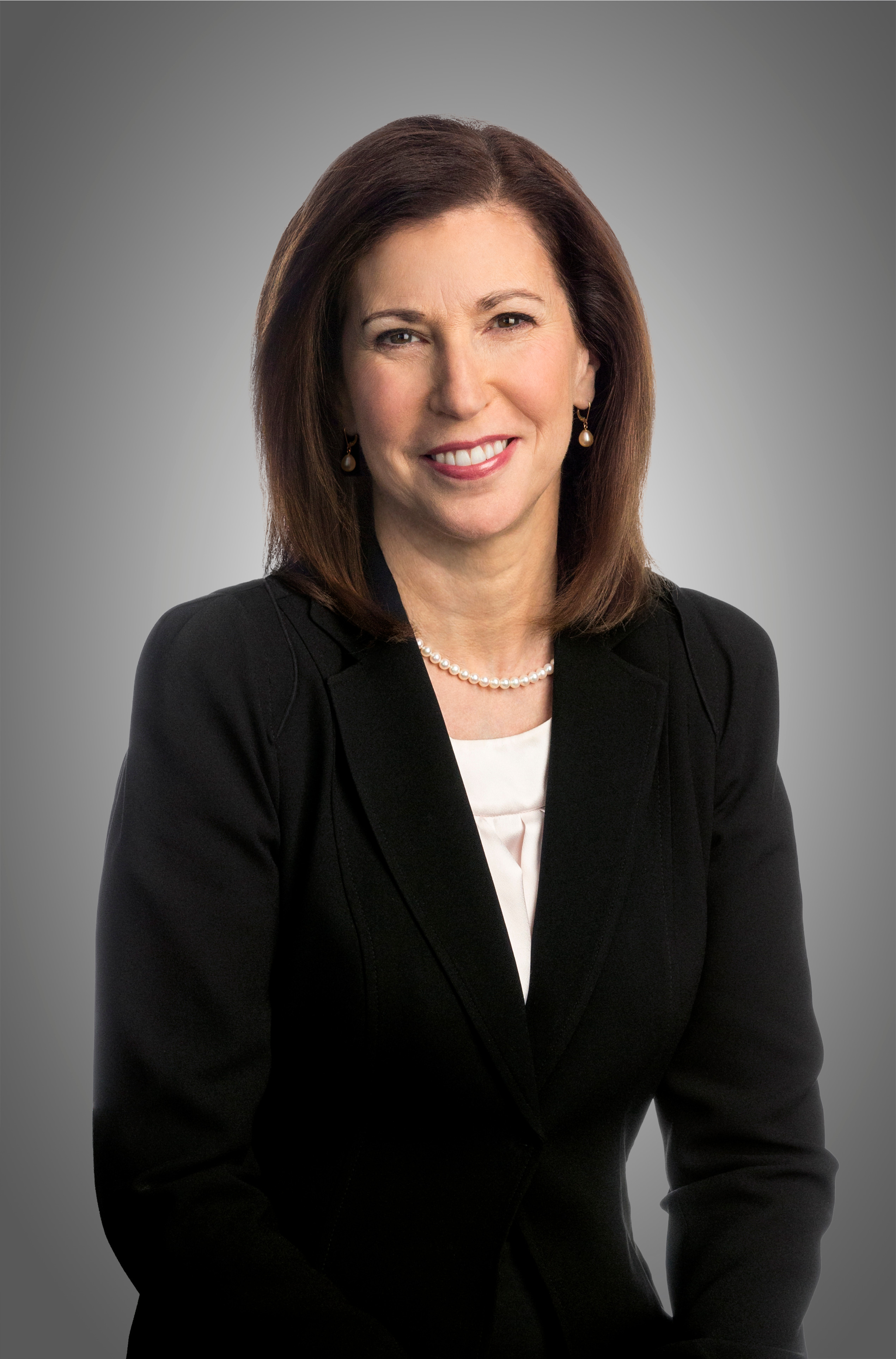 Sutter CEO Sarah Krevans wants health care to be 'dramatically different in 10 years.' Here's how.
Sutter CEO Sarah Krevans wants health care to be 'dramatically different in 10 years.' Here's how.
Sarah Krevans, president and CEO of Sutter Health, talks about what's not in her professional biography, discusses how California's Lake County fires helped define Sutter as a health system, and shares the "very luckiest thing" about herself. Read our interview with Krevans.
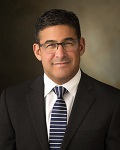 Marc Harrison promised to turn Intermountain into a 'Tesla.' He wasn't kidding.
Marc Harrison promised to turn Intermountain into a 'Tesla.' He wasn't kidding.
Marc Harrison, president and CEO of Intermountain Healthcare, talks about Intermountain's recently announced strategic reorganization, previews the launch of a "virtual hospital" to better serve rural communities, and shares the surprising worry that keeps him up at night. Read our interview with Marc.
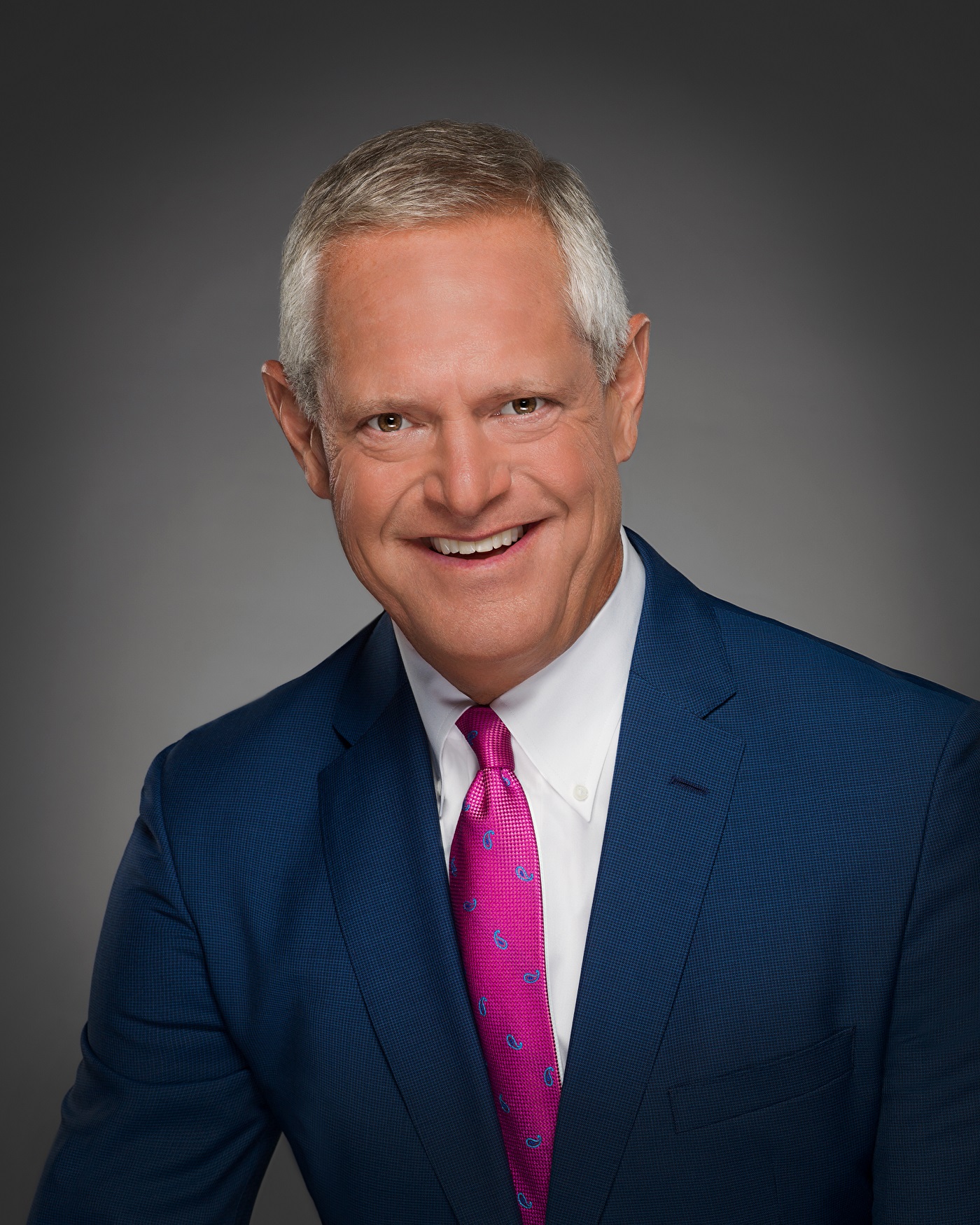 'A little bit of a pirate': How Kelby Krabbenhoft built a $6B system—and where he's taking Sanford next
'A little bit of a pirate': How Kelby Krabbenhoft built a $6B system—and where he's taking Sanford next
Kelby Krabbenhoft, president and CEO of Sanford Health, talks about the unprecedented CEO-philanthropist partnership behind Sanford's rapid growth, why a successful leader needs to be "a little bit of a pirate," and the merger that will make Sanford a nearly $6 billion health system. Read our interview with Kelby.
Don't miss out on the latest Advisory Board insights
Create your free account to access 1 resource, including the latest research and webinars.
Want access without creating an account?
You have 1 free members-only resource remaining this month.
1 free members-only resources remaining
1 free members-only resources remaining
You've reached your limit of free insights
Become a member to access all of Advisory Board's resources, events, and experts
Never miss out on the latest innovative health care content tailored to you.
Benefits include:
You've reached your limit of free insights
Become a member to access all of Advisory Board's resources, events, and experts
Never miss out on the latest innovative health care content tailored to you.
Benefits include:
This content is available through your Curated Research partnership with Advisory Board. Click on ‘view this resource’ to read the full piece
Email ask@advisory.com to learn more
Click on ‘Become a Member’ to learn about the benefits of a Full-Access partnership with Advisory Board
Never miss out on the latest innovative health care content tailored to you.
Benefits Include:
This is for members only. Learn more.
Click on ‘Become a Member’ to learn about the benefits of a Full-Access partnership with Advisory Board
Never miss out on the latest innovative health care content tailored to you.
